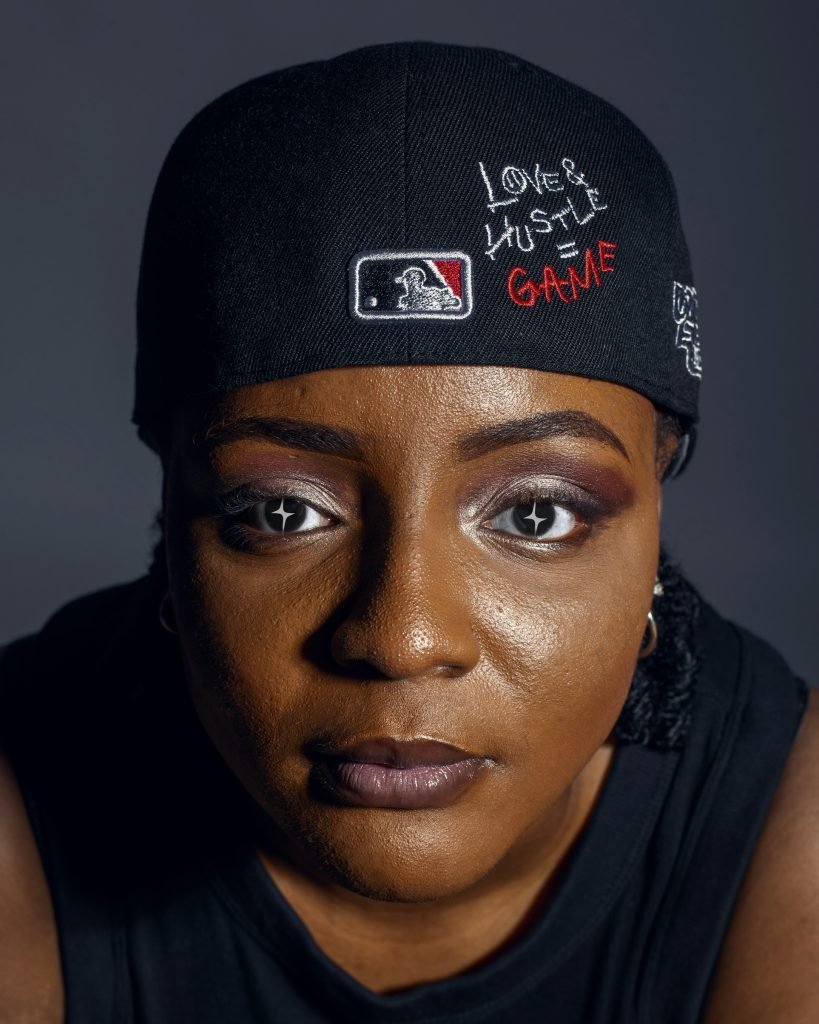
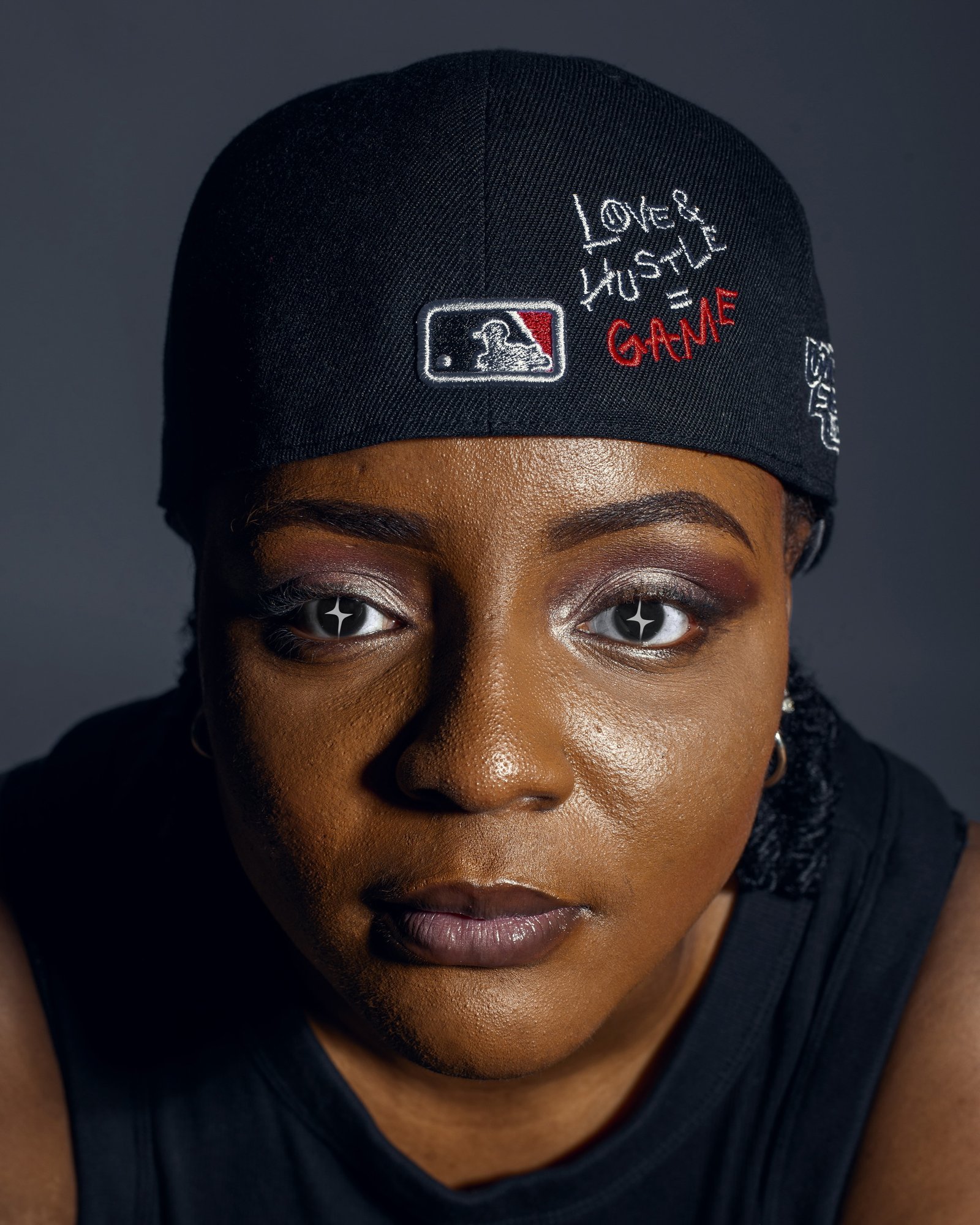
My conversation with Kleros started off with warmth and ease. I just knew that moment was special. It had to be done right. Kleros isn’t just any music producer. She’s a woman making bold moves in a male-dominated field, a changemaker with a story worth documenting. And that’s exactly what The Book is about—stories of the ones daring to do, to shift culture, to break ceilings.
The first time I met Kleros, it was at a Guinness world record attempt by a producer and it was difficult to not see the passion in her and how much she knew her stuff. A woman dominating the same room as men.
I asked how life has been for her since then.
“Progress,” she said, smiling. “A lot more connections, a lot more lessons. That whole experience made me grow. I’ve evolved.”
And it shows.
Every producer has that one moment when the spark ignites. For Kleros, it happened in secondary school.
“I was playing instruments at the time,” she shared. “But one day, I saw someone using production software on the school laptop—my school guardian. I was instantly curious. It felt like I liked watching how music was made even more than listening to it.”
She would borrow the keys to the computer lab on weekends, sneaking in time with the software. That curiosity grew into obsession.
By 2019, in her second year of university, music production had become more than a side passion. “People kept encouraging me. School felt boring on its own—so I added music to the mix,” she laughed.
“I’m the last child. So naturally, I was mommy’s handbag,” she joked. Her mother’s love for all kinds of music exposed her to a wide palette. Her older brother introduced her to hip-hop. “Everything they played compiled in my head,” she explained. “That really shaped the diversity in my sound.”
She also mentioned being largely self-taught.
“I didn’t watch YouTube when I first started. I made a lot of mistakes,” she admitted. “But I’ve always been curious. I watched how people did things. I listened. I asked questions. I learned from their mistakes and from their success too.”
Kleros expressed how she watched people, listened to older people and how she has been a big fan of learning which has also helped shape her Business.
When I asked about the challenges she faced breaking into the industry, especially as a woman in production, Kleros got reflective.
“Sometimes, it’s hard. Especially when you don’t enjoy the spotlight. But in this generation, you have to put yourself out there,” she said. “I used to find that difficult because I genuinely love my space. But I’ve been learning to show up regardless.”
For about two years, she faced a dry spell—where it felt like she was stuck.
“I had to have a serious talk with my mentor. He told me, ‘Focus on what you can control. Work on your sound.’ And that’s what I did. I stopped obsessing over getting in, and I poured myself into improving. Eventually, things shifted.”
She said this helped her discover her strong points, worked on the quality of music and perfect the melodies.
It was through this she discovered she loved the drums and loves to sample songs.
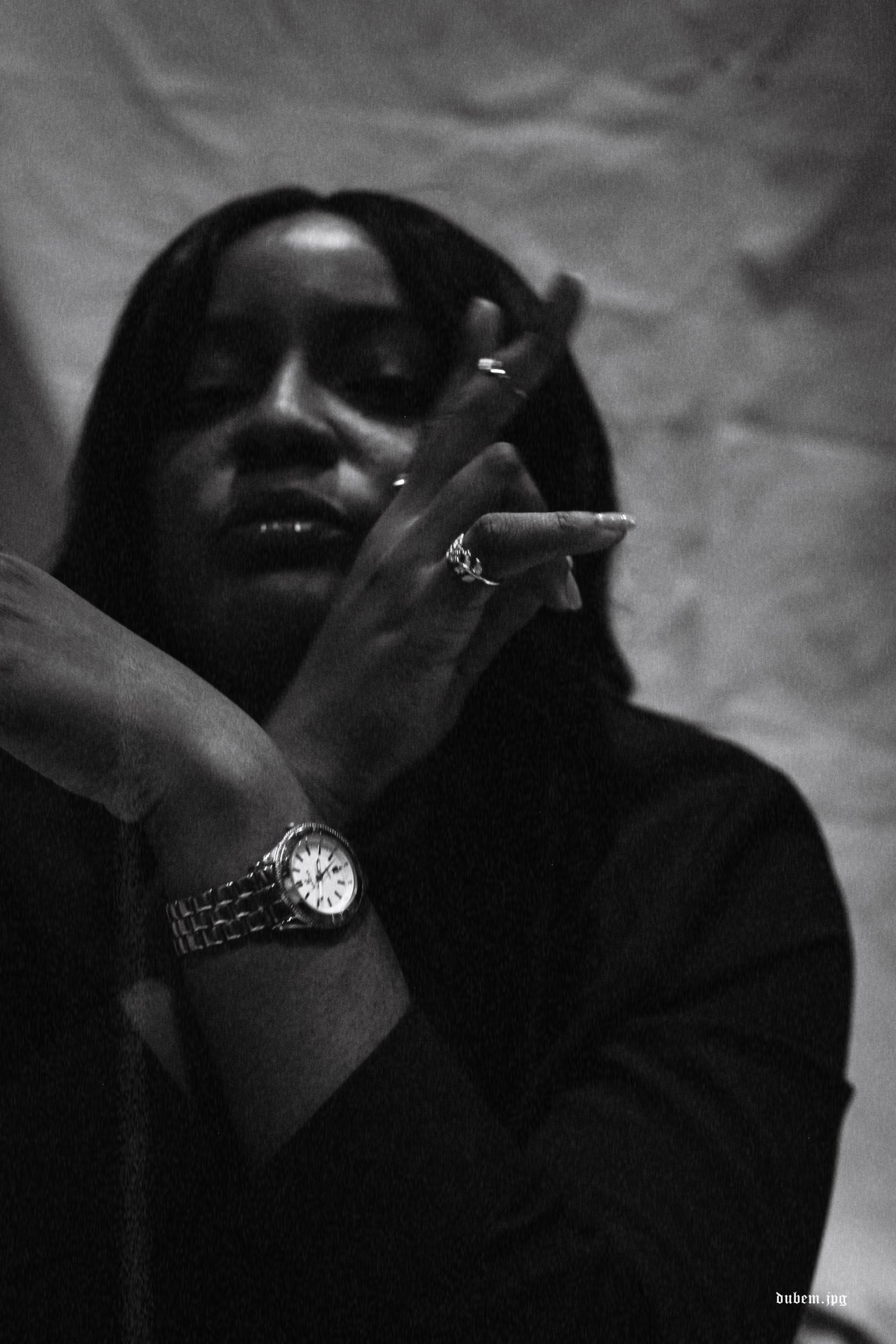
When we got to the topic of quality, her eyes lit up.
“To me, quality sound is something you feel. It’s not just loud or trendy. It’s intentional. It’s when you listen to a track and it surrounds you, even when you’re not wearing headphones. It’s balance.”
And what about people saying producers are recycling beats?
“I understand where that comes from,” she said. “But I think the bigger issue is that we, the creators, have forgotten that we set the tone—not the audience. Right now, it’s a numbers game. People are chasing streams, so everyone’s trying to replicate the same sound. But we owe it to ourselves to push boundaries.”
Kleros separates herself from the pack by refusing to make “regular” music.
“My beats always have a fusion. Even if it starts like something familiar, I find ways to evolve it into something unexpected.”
One of the most powerful parts of our conversation was her honesty about the industry’s imbalance—particularly how producers are often sidelined.
“Producers are still being underpaid, overlooked. It’s like everyone gets credit—the artist, the video director—except the person who built the entire song from scratch,” she said.
She shared how some producers are given just 10 points out of 100 on a song, and even that feels like a favor if you’re not working with a big name.
“That needs to change. Producers need to start valuing themselves more. Charge what you’re worth.”
Talking about “hits.”
“Can you predict a hit?” I asked.
“You can feel when a song is great. But a hit? That’s marketing. You can make the best song in the world, but without the right push, it’ll go nowhere. Sometimes the worst songs blow up simply because of strategy.”
And what about her own moment—her first big production milestone?
“That would 2023, Lemon Vinyl,” she said without hesitation. “I created Be there with Remade and mustapha. From the moment we recorded it, I knew it was special. The audience it pulled was unexpected.” She pointed out the song felt through to her artistic nature and satisfied who she is as a producer.
On her creative process she talked about something she picked up from a masterclass earlier in the year which was every single creative idea should be taken down as there are no mistakes and when you’ve maxed out you can take a rest go back and work on it technically. “Lay it down first”
Kleros loves originality and has a way of balancing it with different artistes which is the power of convincing especially when dealing with artistes who do not understand the uniqueness of one’s own sound or are yet to develop “Make it seem like it’s their idea” and another method for her is to not force it.
For Kleros, what tells them apart is the ability to tell a story through their creations.
“A producer can structure the song and then communicate it. It’s in this case the producer can help the artiste create the song.”
For Kleros “to whom much is given, much is expected. I like the responsibility” she disclosed that at the start of her career she didn’t think she was an inspiring person but now people reach out to be taught by her. “Last year, I taught a beginners production class with about 6-10 students for about two months.”
She shared that she is enjoying the whole process and giving back. “I like that people can see me as an example.”
The vision for Kleros five years from now is to have made a lot of inspiring music.
“I want a couple of Kleros productions on people’s playlists. I want to have won a couple awards too. I want to have introduced the world to new sides of Kleros and I pray for them to be received well.”
She announced that she has started Djing. And she hopes to have her own shows.
Her message to emerging producers, that young girl sitting in her room and playing with sounds unsure of the world of music and how to break in:
“Keep showing up. Don’t worry about how you will break in. If you are meant to, you will.” She shared that she believes in purpose and no knowledge is ever wasted.
“Don’t feel intimidated, there’s time for everything. Pick up skills as you go.”
Interview conducted and written by Andrea Andy.
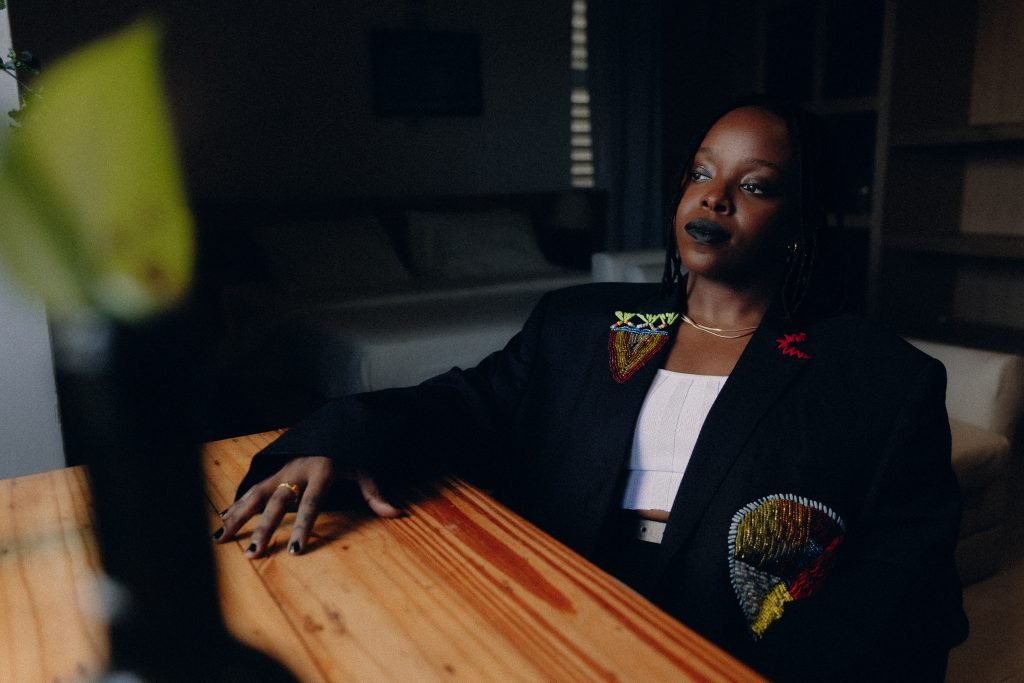
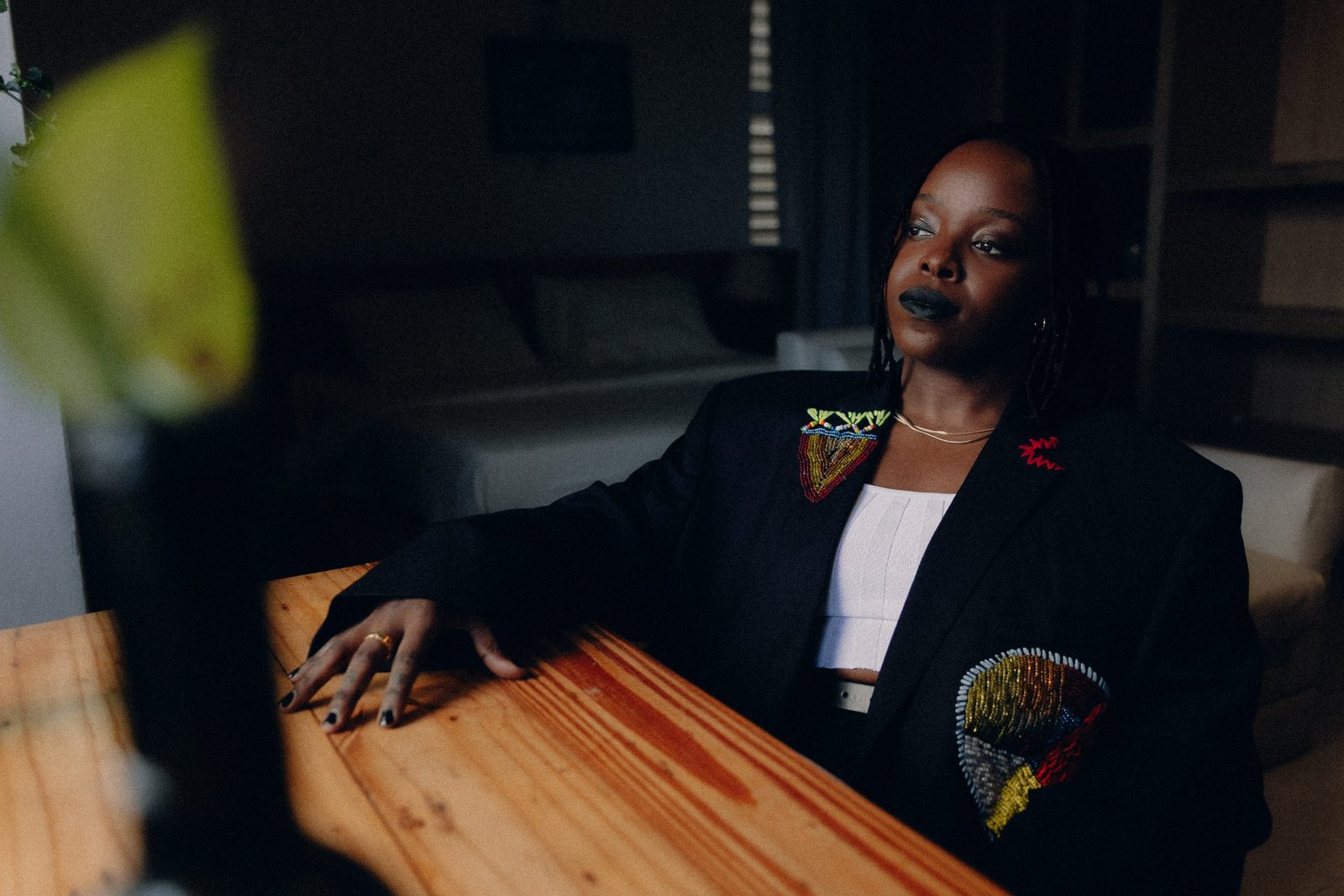
When you sit with Joyce Olong, you’re not just in conversation — you’re in communion with a creative spirit deeply attuned to her calling. A singer, songwriter, and producer with a journey rich in intentionality, Joyce is one of the few who not only wears many hats but glides effortlessly in each.
From the very start of our chat for The Book, it was clear that Joyce is not just here to make music — she’s here to walk in her purpose. She described discovering her gift at the tender age of seven. “I think I knew very early on that this was my gift… from seven, that’s when I was, like, sure that music is my way.” That conviction has never wavered, even when life presented tests that seemed crafted to break her resolve.
Born into a household where music of every kind echoed from room to room — from Gregorian chants to Whitney Houston, from Makossa to Lebanese pop — her sonic palette is broad and bold. That fusion of sounds is not just nostalgia. It’s alchemy. “It was a real mess of amazing music,” she recalls, laughing. But it’s clear: that “mess” was magic.
Interestingly, Joyce’s entry into music didn’t begin with her voice — it began with instruments. Piano. Saxophone. Rhythm. She was always curious about what made a song a song, even before she knew how to carry a note. “I actually didn’t start off singing. I started off just playing the piano… I wasn’t really a good singer,” she admits with a chuckle.
But then came a turning point — witnessing two girls named Joyce and Phoebe perform at a music competition. It lit a fire in her. “I was like, how did you do that?” That awe turned into obsession, and she began teaching herself how to make her voice match the sound she heard in her head.
Soon after, Joyce became her own band and choir director — drafting her siblings into mini studio sessions. “I’ll make my siblings come to my room… you sing this alto part, you sing this soprano…” It wasn’t just play. It was training. It was vision.
Her love for production remains her most profound. “I liked the idea of music coming out of nothing… from your mind to piano and then computer, and all of a sudden there’s music. It was very cool for me.”
For Joyce, the question of balancing creativity across roles doesn’t even apply. “For me, I like all the hats.”
“You’re not really spreading yourself thin… it’s the whole thing.” She believes artists should expand — sketch, paint, evolve. She’s fascinated by how different producers approach their process. “I found myself watching people make beats… trying to collect packs… some people be hoarding crack-level plugins!”
There’s joy in her curiosity. There’s purpose in her process. Whether she’s sketching a melody sparked by the strum of a guitar or pulling feelings out of thin air to lace into her lyrics, the creative process remains, to her, “just abracadabra. Tinkerbell stuff.”
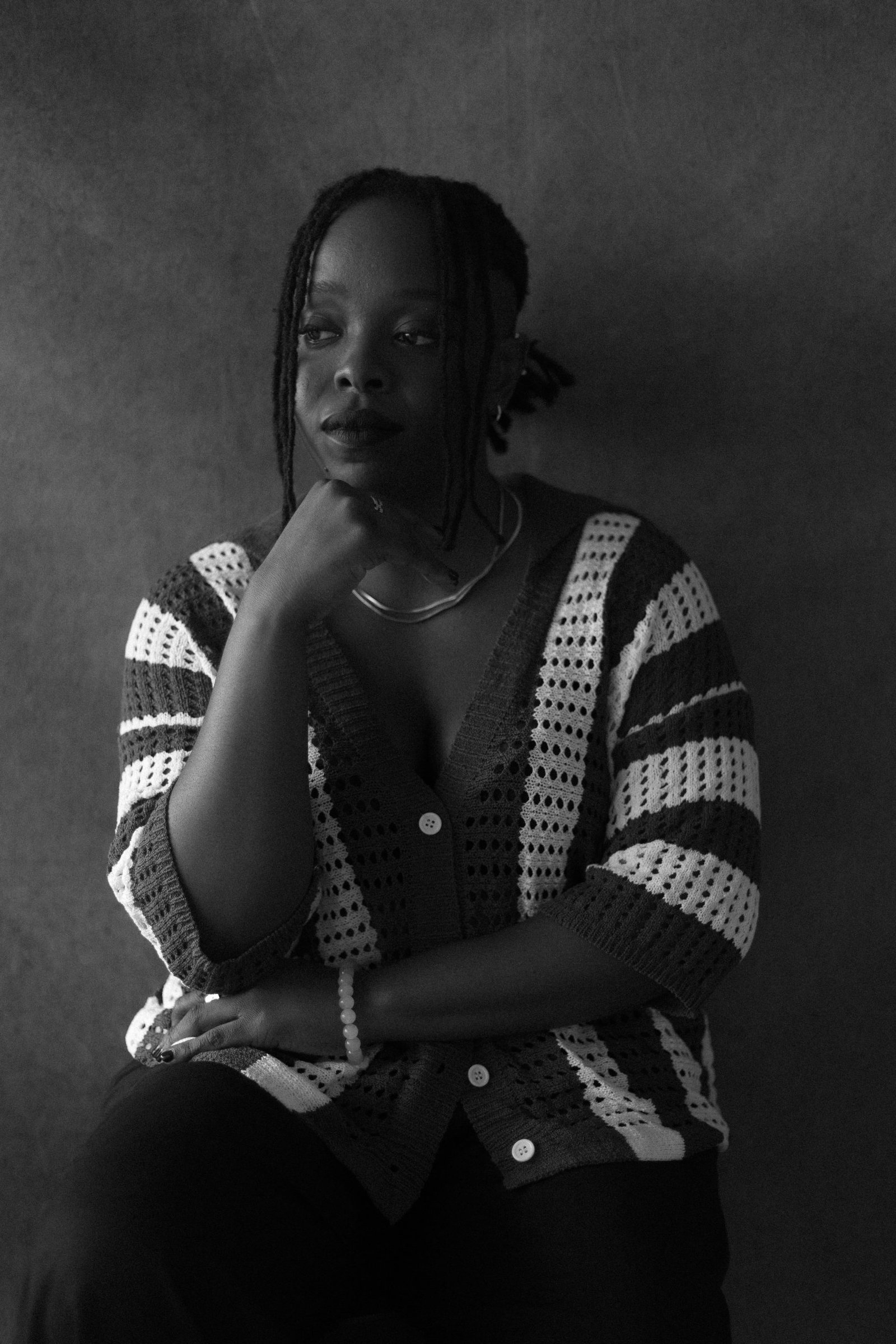
When we talked about staying true to her artistry in an industry that often prizes trends, commercial appeal over the truth of your artistry, Joyce got real. “You have to be stubborn… somebody has to say, ‘ah, she’s difficult to work with.’ That’s why you’re doing the right thing.” She likens the industry to a game — and artists, to birds. “You can be a crane, be a flamingo… a nice bird that just does their own thing.” She advises to always keep something for yourself but not always be too attached to your work.
That self-awareness leads her to approach music with care and detachment. “You love her when you let her go,” she says, referring to the art of releasing music. She knows that sometimes the songs she creates may not fit in — but that doesn’t mean they don’t belong.
As a woman in a male-dominated industry, Joyce acknowledges the power of community. She spoke fondly of a recent music camp with Dami Oniru — a space for female producers, musicians, and writers. There was yoga. There was mindfulness. But most importantly, there was music — unfiltered, unfettered.
“Make friends, do your part, and go home,” she advised. “Always go where you are invited. Don’t loiter.” It was both humorous and sobering — a reflection of navigating an industry that often doesn’t create enough room for women to simply be.
One of Joyce’s most vulnerable revelations was about losing an entire project — not once, but thrice, this was in 2021/2022. “My laptop, my hard drives, my Google Drive… gone. Like, how did you get there?” But instead of letting it break her, she saw it as divine redirection. “Losing music made me want to push harder… giving up on music is like giving up on myself.”
It’s clear that every loss, every silence, every glitch in the system has only fortified her purpose. It was at this point she decided she cannot give up on music. “You don’t give up until you are done.”
She reflected on how she was very conscious of what type of music she made but now she is more herself, “more daring, courageous – I prayed for this.”
On new emotions in her music, she highlighted that she earlier used to communicate problems and where she was but in Joyce’s latest project — an 8-song live EP — is an intentional pivot. “I want to convey comfort and luxury.” It’s a shift from pain to peace, from chaos to clarity. She’s not trying to rush listeners. She’s inviting them to pace life with her music.
The producer in her is also seeking growth. She’s already thinking about her next soundscape — something unlike what she just released. “I brought out my R&B, my ambient… now I want to do something different, to improve my skills.”
Five years from now, Joyce hopes to be both an artist and an enabler of greatness. “I want to help others be great, be of good service… I just pray God blesses me with enough resources to bless other people with.”
In a world obsessed with metrics, Joyce is championing something deeper — community, care, and creativity. She warns against a numbers-first approach in African music. “Respect your consumers. We need better structures. If there’s structure, we’re good to go.”
She talked about how we are a good source as a people and as an Industry and with the right structure we would be limitless.
As a female producer, Joyce believes women bring a unique sensitivity to sound. “It’s like we hear things differently, feel it differently.” She recounts a session with Keziah Mallam and GBots “It started as a jazz beat… it became Afro jazz… it had a pink touch. Finesse.”
Her takeaway? “We need more ladies in the space producing. There’s a touch — a touch I like.”
To future generations, Joyce Olong would say, “Speak life. Manifest your future.” Her music is a vessel for belief, a call to faith. “I want my music to make people believe. Believe. Have faith.”
And with that, the conversation — the communion — ends, not with a goodbye, but a benediction.
Interview conducted and written by Andrea Andy.